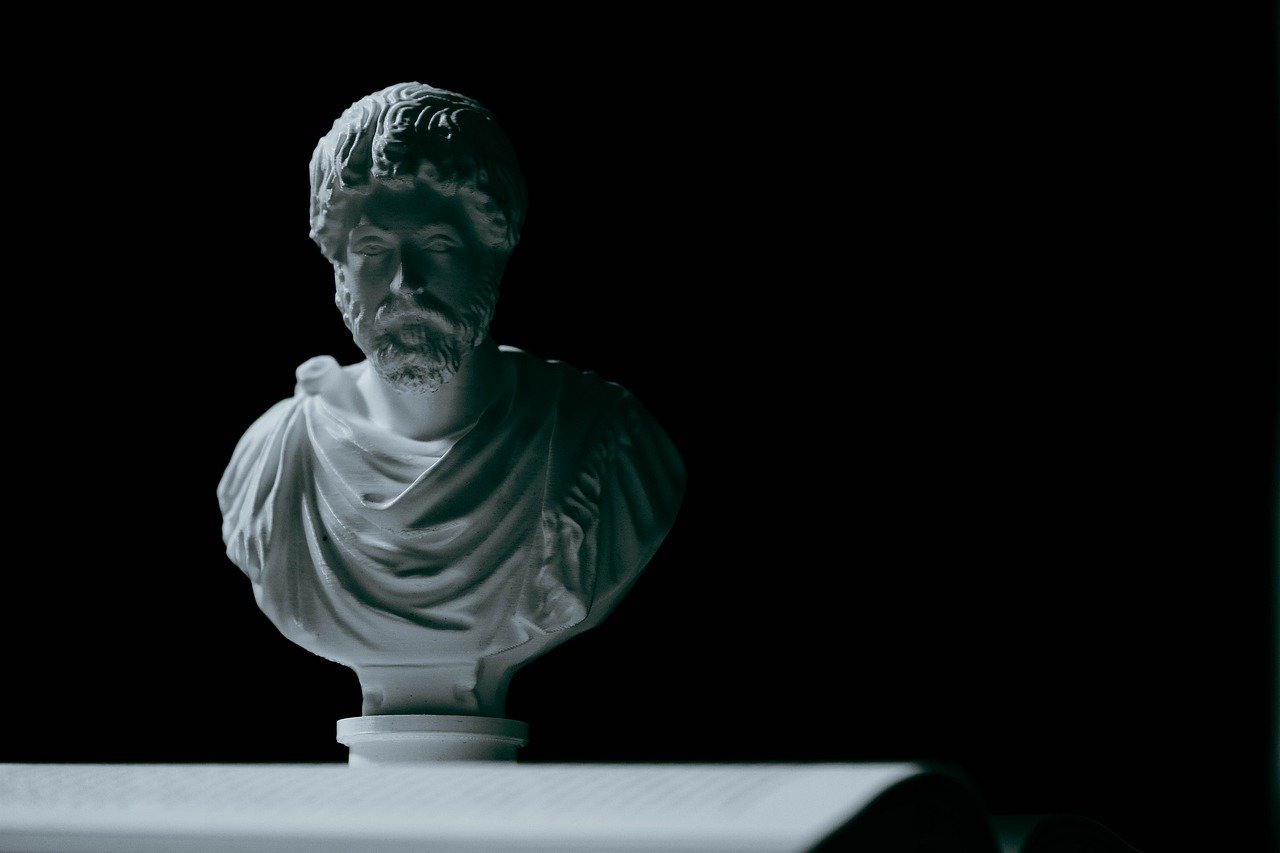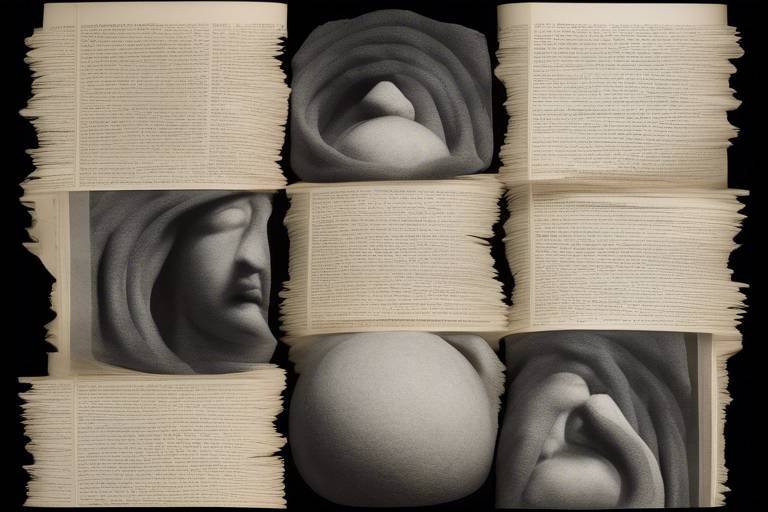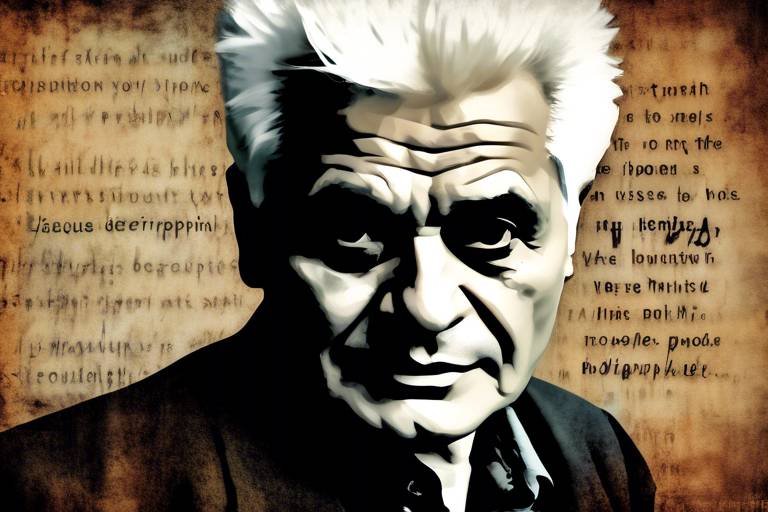What Is the Ultimate Truth - Philosophical Approaches
When we dive into the concept of ultimate truth, we embark on a journey that transcends mere definitions and touches the very essence of our existence. What does it mean to seek the ultimate truth? Is it a singular entity, or does it manifest in various forms depending on our perception? Throughout history, philosophers have grappled with these questions, offering a tapestry of interpretations that challenge our understanding of reality. From the ancient musings of Plato to the modern critiques of postmodern thinkers, the quest for ultimate truth is as multifaceted as life itself.
At its core, ultimate truth can be viewed as the foundation upon which all knowledge is built. It is the unchanging reality that underlies the chaos of our experiences. However, defining it is no simple task. Different philosophical schools provide varying perspectives, each adding a unique layer to our comprehension. For instance, while some argue that ultimate truth is an abstract ideal, others assert that it is grounded in empirical reality. This divergence in thought not only enriches philosophical discourse but also invites us to reflect on our own beliefs and the nature of our understanding.
As we explore these philosophical approaches, we uncover a rich landscape of ideas. Imagine standing at a crossroads, with each path leading to a different interpretation of truth. Some paths might lead to abstract ideals, while others ground us in observable phenomena. This journey is not merely academic; it challenges us to confront our assumptions and expand our horizons. Are we ready to embark on this adventure of thought, to question what we know and seek deeper meanings? The exploration of ultimate truth is not just about finding answers; it’s about embracing the questions that lead us to those answers.
In the sections that follow, we will delve into various philosophical perspectives, beginning with Platonic Idealism, which posits that ultimate truths exist in a realm of forms beyond our physical reality. We will then contrast this with Aristotelian Realism, which emphasizes empirical observation. Following this, we will navigate the waters of Existentialism, where personal authenticity reshapes our understanding of truth. Finally, we will examine Postmodern Perspectives, which challenge the very notion of a singular ultimate truth, advocating instead for a plurality of truths shaped by context and narrative.
As we embark on this philosophical journey, let’s keep in mind that the search for ultimate truth is as much about the process as it is about the destination. Each philosophical approach offers a lens through which we can examine our beliefs, our realities, and ultimately, ourselves.

Defining Ultimate Truth
Understanding what constitutes ultimate truth is foundational in philosophy. This concept has intrigued thinkers for centuries, leading to a myriad of interpretations and definitions that reflect the complexity of human thought. At its core, ultimate truth seeks to answer profound questions about existence, reality, and the nature of knowledge itself. But how do we even begin to define such an elusive concept?
Historically, philosophers have approached ultimate truth from various angles. For instance, some argue that it is an absolute, unchanging reality that exists independently of human perception, while others believe that truth is inherently subjective and shaped by individual experiences. This divergence raises compelling questions: Is there a singular truth, or are there multiple truths that coexist? Can truth be objective, or is it always colored by personal perspectives?
To explore these questions, we can look at some of the most influential philosophical traditions. For example, Plato introduced the idea of ideal forms—abstract representations of objects and concepts that exist in a non-physical realm. According to Plato, ultimate truths are not found in the material world but rather in these ideal forms, which offer a more profound understanding of reality. In contrast, his student, Aristotle, emphasized empirical observation and the tangible world, suggesting that ultimate truth can be discovered through our senses and experiences.
In modern philosophy, existentialists challenge traditional notions of truth by focusing on the individual's experience. They argue that ultimate truth is not a universal concept but rather a personal journey of self-discovery and authenticity. This perspective shifts the emphasis from an objective truth that applies to everyone to a more fluid understanding of truth that varies from person to person.
Ultimately, defining ultimate truth is a complex endeavor, and it may be more about the questions we ask than the answers we find. As we navigate through various philosophical perspectives, we begin to appreciate the richness of this concept and its implications for our understanding of reality and existence. Each philosophical school offers a unique lens through which we can examine the nature of truth, encouraging us to reflect on our beliefs and the world around us.
- What is ultimate truth? Ultimate truth refers to the fundamental reality that underlies existence and knowledge, often debated in philosophical discourse.
- How do different philosophers view ultimate truth? Philosophers like Plato and Aristotle offer contrasting views; Plato sees it in ideal forms, while Aristotle emphasizes empirical observation.
- Can truth be subjective? Yes, existentialist philosophers argue that truth is shaped by individual experiences and personal authenticity.
- Is there a single ultimate truth? This is a contentious issue, with some arguing for a singular truth and others advocating for multiple, context-dependent truths.

Platonic Idealism
Platonic idealism is a fascinating philosophical framework that suggests that ultimate truths exist beyond our physical reality. According to Plato, the world we perceive through our senses is merely a shadow of a higher realm of forms, where ideals and perfect versions of concepts reside. Imagine walking through a museum filled with statues; each statue represents a physical manifestation of an ideal form. The statue of a horse, for instance, is not the ultimate horse but rather a reflection of an ideal horse that exists in the realm of forms – a perfect concept that our physical world can only aspire to imitate.
This theory invites us to consider the profound implications of our perceptions. Plato argued that most people live in a state of ignorance, mistaking the shadows on the wall of a cave for reality itself. This allegory, known as the Allegory of the Cave, serves as a powerful metaphor for the philosophical journey toward understanding ultimate truths. The cave represents our limited perspective, where we only see reflections of the real world, while the outside world symbolizes enlightenment and the pursuit of true knowledge.
In the Allegory of the Cave, Plato describes prisoners who have been chained inside a dark cave their entire lives. They can only see the wall in front of them, where shadows cast by objects behind them create a distorted view of reality. When one prisoner escapes and discovers the outside world, he realizes that the shadows were mere illusions. This journey from the cave into the light represents the philosopher's quest for knowledge and truth. It’s a bit like stepping out of a dark room into the bright sunlight; at first, it’s blinding, but eventually, you adjust and see the world in vivid colors.
The distinction between shadows and reality in the cave allegory underscores the importance of perception in grasping ultimate truth. The shadows on the wall symbolize the opinions and beliefs we often accept without question. Plato believed that these perceptions are unreliable and can lead us astray. To truly understand reality, we must engage in critical thinking and philosophical inquiry, challenging our assumptions and seeking deeper knowledge. Just as a sculptor must chisel away at a block of marble to reveal the statue within, we must refine our understanding to uncover the ultimate truths hidden beneath our surface-level perceptions.
Escaping the cave is not just a metaphorical journey; it symbolizes the challenges and rewards of seeking deeper understanding beyond superficial beliefs. The process is often fraught with difficulties, as the escapee faces skepticism from those still trapped in the cave. This resistance to change is akin to a fish trying to leave the water; it’s comfortable in its environment but must adapt to survive outside. Plato encourages us to embrace this discomfort and pursue knowledge relentlessly, as the rewards of enlightenment far outweigh the struggles faced along the way.
In summary, Platonic idealism invites us to look beyond the surface of our experiences and seek the ultimate truths that lie beneath. By understanding the nature of reality through the lens of ideal forms, we can develop a more profound appreciation for existence and our place within it. This philosophical perspective not only challenges us to question our beliefs but also inspires us to embark on a lifelong journey of discovery and enlightenment.

The Allegory of the Cave
Plato's Allegory of the Cave is one of the most profound metaphors in philosophy, highlighting the transformative journey from ignorance to enlightenment. Imagine a group of people who have been chained inside a dark cave for their entire lives, facing a blank wall. Behind them, there is a fire, and between the fire and the prisoners, puppeteers cast shadows on the wall. These shadows represent the only reality the prisoners know. They believe these shadows are the entirety of existence, unaware that there is a world outside the cave filled with vibrant colors, sounds, and life.
This allegory serves as a powerful metaphor for the human condition. The shadows symbolize the illusions and misconceptions that many people accept as reality. Just like the prisoners, we often find ourselves trapped in our own perceptions and societal norms, mistaking them for the ultimate truth. Plato suggests that the journey to enlightenment is akin to breaking free from these chains and ascending to the light of knowledge and understanding. It’s a challenging process, filled with discomfort and resistance, as we must confront the reality that our previous beliefs were merely shadows of the truth.
The moment a prisoner escapes the cave and sees the world outside is a pivotal point in the allegory. This experience represents the awakening of the intellect. Initially, the sunlight overwhelms the escapee, causing pain and confusion, much like how confronting uncomfortable truths can unsettle us. However, as the eyes adjust, the former prisoner begins to perceive the world in its true form, realizing that the shadows were just a fraction of reality. This shift from darkness to light symbolizes the philosophical journey towards ultimate truth—a journey that requires courage, persistence, and an open mind.
The allegory also raises essential questions about the nature of knowledge and the role of education. Is it the responsibility of those who have seen the light to return to the cave and help others escape? This idea introduces the concept of the philosopher-king, someone who understands the ultimate truth and has the moral obligation to lead others towards enlightenment. However, this task is fraught with challenges, as those still in the cave may resist or ridicule the insights of the enlightened.
In essence, Plato’s Allegory of the Cave invites us to reflect on our own lives. Are we merely observing the shadows on the wall, or are we brave enough to seek out the light? The journey to understanding ultimate truth is not just a philosophical endeavor; it’s a personal quest that can lead to profound transformation. Just as the freed prisoner returns to the cave, we too can share our insights, encouraging others to question their own realities and embark on their journeys towards enlightenment.

Shadows and Reality
In Plato's allegory of the cave, the distinction between shadows and reality serves as a powerful metaphor for the human condition. Imagine being chained in a dark cave, only able to see shadows cast on a wall by objects behind you. These shadows represent the limited perceptions we often accept as reality. The prisoners, unaware of the true forms behind them, mistake these fleeting images for the entirety of existence. This scenario is not just a philosophical exercise; it mirrors our daily lives where we frequently confuse appearance with reality.
The shadows symbolize the illusions and misconceptions that cloud our understanding of ultimate truth. Just as the prisoners are deceived by the shadows, we too can fall prey to biases and societal narratives that shape our beliefs. Our senses, while essential for navigating the world, can often mislead us. For instance, consider how optical illusions trick our eyes into seeing something that isn't there. This highlights the importance of questioning our perceptions and seeking deeper truths beyond what is immediately visible.
Moreover, the journey from shadows to reality involves a transformative process. It requires critical thinking and a willingness to challenge our preconceived notions. When one begins to question the shadows, it opens the door to a broader understanding of existence. This quest for knowledge is not merely an intellectual pursuit; it is a deeply personal journey that can lead to profound revelations about ourselves and the world around us. The transition from the cave into the light symbolizes enlightenment, where one begins to grasp the essence of ultimate truth.
As we explore the implications of this allegory, we must ask ourselves: how often do we settle for the shadows in our own lives? Are we willing to venture out of our comfort zones to seek the light of understanding? The journey is fraught with challenges, as it often involves confronting uncomfortable truths about our beliefs and values. However, the rewards of such exploration are immeasurable, leading to a richer, more authentic experience of life.
In essence, the distinction between shadows and reality is not just a philosophical concept; it is a call to action. It urges us to embrace the journey of discovery and to seek the deeper truths that lie beyond the surface. By doing so, we can transform our understanding of reality and ultimately, ourselves.
- What does the allegory of the cave represent? The allegory represents the journey from ignorance to enlightenment, illustrating how our perceptions can be misleading.
- How can we distinguish between shadows and reality in our lives? By questioning our beliefs, seeking knowledge, and being open to new perspectives, we can begin to discern deeper truths.
- Why is critical thinking important in understanding ultimate truth? Critical thinking allows us to challenge misconceptions and biases, leading to a more accurate understanding of reality.

Escaping the Cave
Escaping the cave is not just a physical act; it symbolizes a profound journey toward enlightenment and understanding. Imagine being chained in a dark cave, only able to see the flickering shadows on the wall. These shadows represent the limited knowledge and superficial beliefs we often cling to. When one finally breaks free from these chains and steps into the light, it’s akin to a rebirth—an awakening to the vastness of reality that lies beyond mere appearances.
The process of escaping the cave is fraught with challenges. Initially, the brightness of the sun can be blinding, representing the discomfort of confronting uncomfortable truths. Just like a newborn struggling to adjust to the light, individuals often resist this new understanding because it disrupts their familiar worldview. However, this struggle is essential. As Plato suggests, enlightenment is not a destination but a continuous journey of discovery. Each step taken outside the cave brings new insights and deeper comprehension of what ultimate truth entails.
Moreover, the journey requires courage and perseverance. Many people prefer the comfort of shadows because they are familiar and safe. Yet, true growth comes from facing the unknown and questioning established beliefs. This is where the metaphor of the cave becomes particularly powerful; it challenges us to confront our own 'caves'—the limiting beliefs and societal norms that shape our perceptions. In this light, escaping the cave is not merely about seeking knowledge but about embracing the vulnerability that comes with it.
As one navigates this path, it’s crucial to recognize that the journey is uniquely personal. Each individual's experience will vary, influenced by their background, culture, and personal history. The insights gained can lead to a richer understanding of existence, fulfilling the human desire for meaning and connection. To illustrate this, consider the following table that highlights the key stages of escaping the cave:
| Stage | Description |
|---|---|
| Awareness | Realizing that the shadows are not the entirety of existence. |
| Struggle | Confronting discomfort as one adjusts to new truths. |
| Discovery | Gaining insights about reality and the nature of truth. |
| Integration | Applying newfound knowledge to enrich one’s life and understanding. |
In conclusion, escaping the cave is an essential metaphor for personal growth and the pursuit of ultimate truth. It encourages us to question our perceptions, embrace discomfort, and ultimately seek a deeper understanding of reality. This journey, though challenging, is one of the most rewarding endeavors one can undertake, leading to a life filled with authenticity and profound insights.
- What does the cave represent in Plato's allegory? The cave symbolizes ignorance and the limitations of human perception.
- Why is escaping the cave important? It represents the journey toward enlightenment and a deeper understanding of truth.
- Are the truths discovered after escaping the cave absolute? Not necessarily; they can be subjective and influenced by personal experiences.

Aristotelian Realism
When we dive into , we are greeted with a refreshing contrast to the idealism of Plato. Aristotle, a student of Plato, took a different route that emphasizes the significance of empirical observation and the tangible world around us. Unlike his mentor, who believed in a realm of perfect forms, Aristotle argued that ultimate truths are grounded in the physical world. This approach invites us to engage with reality as it is, rather than as we wish it to be. In essence, Aristotle posited that understanding comes from our experiences and interactions with the world, making knowledge a product of observation and reason.
At the heart of Aristotelian realism is the belief that substances are the fundamental building blocks of reality. For Aristotle, substances are individual entities that possess their own essence. This means that everything we perceive—be it a tree, a rock, or a human being—has a specific nature that can be understood through careful observation. Thus, knowledge is not merely about abstract thought; it is about engaging with the world and uncovering the truths that lie within it.
Aristotle's approach also emphasizes the importance of causality. He introduced the concept of the four causes—material, formal, efficient, and final—which help explain why things are the way they are. By understanding these causes, we can gain a deeper insight into the nature of reality. For instance, if we consider a wooden chair, we can analyze:
| Type of Cause | Description |
|---|---|
| Material Cause | The wood from which the chair is made. |
| Formal Cause | The design or blueprint of the chair. |
| Efficient Cause | The carpenter who constructed the chair. |
| Final Cause | The purpose of the chair, which is to provide a place to sit. |
This table illustrates how Aristotelian realism encourages a comprehensive understanding of objects and their existence. By examining these different causes, we can appreciate the complexity of reality and the various factors that contribute to the existence of things. It’s like peeling back the layers of an onion—each layer revealing more about the essence of what we are observing.
Moreover, Aristotle's emphasis on empirical evidence encourages us to question our assumptions and beliefs. He believed that through rigorous observation and logical reasoning, we can arrive at truths that are not only profound but also applicable to our daily lives. This scientific approach laid the groundwork for many modern scientific methods, urging us to rely on evidence rather than conjecture.
In conclusion, Aristotelian realism offers a robust framework for understanding ultimate truth. By focusing on the physical world and the importance of empirical observation, Aristotle challenges us to engage with reality directly. It’s a reminder that truth is not just a lofty ideal but something we can touch, see, and experience. As we continue to explore the depths of philosophical thought, Aristotle’s insights remain relevant, urging us to seek knowledge in the world around us.

Existentialism and Truth
Existentialism is a philosophical movement that dives deep into the individual experience, challenging traditional notions of truth. At its core, existentialism posits that truth is not a fixed entity waiting to be discovered; rather, it is a fluid concept shaped by personal experiences and choices. This perspective invites us to explore how our unique journeys inform our understanding of what is real and meaningful. Imagine standing at a crossroads, where every path represents a choice that will shape your perception of truth. This is the essence of existentialism—a constant navigation through the complexities of existence.
One of the most compelling aspects of existentialism is its emphasis on authenticity. For existentialist thinkers like Jean-Paul Sartre and Simone de Beauvoir, living authentically means embracing one's freedom and responsibility to create meaning in an otherwise indifferent universe. Authenticity is not just about being true to oneself; it’s about actively engaging with the world and making choices that resonate with one's inner values. When individuals choose to live authentically, they often experience profound revelations about their own truths. This journey can be both exhilarating and terrifying, as it requires a deep dive into the self and a willingness to confront uncomfortable realities.
However, with this freedom comes the burden of choice. Existentialism teaches that every decision we make carries weight, influencing not only our personal truths but also how we relate to the world around us. This responsibility can feel overwhelming at times, as it forces us to acknowledge that our choices define our existence. Think about it: every time you make a decision, you’re not just choosing a direction; you’re also crafting your own reality. This idea can be liberating, but it can also lead to existential angst—a feeling of disorientation and confusion in the face of life’s uncertainties.
Moreover, existentialists argue that truth is inherently subjective. What may be true for one person might not hold the same weight for another. This subjectivity raises intriguing questions about the nature of reality itself. Are there universal truths, or is everything colored by personal perception? This line of questioning invites us to reflect on our beliefs and consider how they are shaped by our experiences. In a world where many perspectives coexist, the challenge lies in recognizing and respecting the multiplicity of truths.
In summary, existentialism reshapes our understanding of truth by placing it firmly in the hands of the individual. It encourages us to seek authenticity, embrace the burden of choice, and acknowledge the subjective nature of our realities. Ultimately, the journey to uncovering ultimate truth is not a solitary pursuit but a shared human experience, rich with complexity and depth. So, as you navigate your own path, remember that your truth is uniquely yours, shaped by every choice, every experience, and every moment of reflection.
- What is existentialism? - Existentialism is a philosophical movement that emphasizes individual existence, freedom, and choice, often exploring the meaning of life from a subjective perspective.
- How does existentialism define truth? - Existentialism defines truth as subjective and shaped by personal experiences and choices, rather than as an absolute or universal concept.
- Who are the key figures in existentialism? - Key figures include Jean-Paul Sartre, Simone de Beauvoir, Friedrich Nietzsche, and Martin Heidegger, each contributing unique perspectives to existential thought.
- What role does authenticity play in existentialism? - Authenticity is central to existentialism, as it emphasizes the importance of living in accordance with one's true self and values, leading to a more meaningful existence.

Truth in Authenticity
For existentialists, the concept of authenticity is not just a philosophical buzzword; it is the very essence of understanding and embracing one's truth. Imagine standing in front of a mirror, but instead of seeing your reflection, you see a collage of societal expectations, fears, and the myriad roles you play in your daily life. This, my friend, is the struggle many face in their quest for authenticity. The existentialists argue that to grasp the ultimate truth, one must peel away these layers and confront the raw, unfiltered self.
Living authentically means aligning your actions with your true self, which often requires a deep dive into your values, desires, and motivations. It’s like embarking on a treasure hunt where the prize is not gold or jewels, but a profound understanding of who you are. This journey can be daunting; it requires vulnerability, courage, and the willingness to face uncomfortable truths about oneself. But why is this pursuit of authenticity so crucial? Because it leads to personal revelations that resonate with the core of our existence.
When individuals embrace their authentic selves, they often experience a sense of liberation. They break free from the chains of conformity and societal pressures, allowing them to express their thoughts and feelings genuinely. This authenticity can manifest in various ways:
- Emotional Honesty: Being truthful about your feelings, whether they are joyous or painful.
- Personal Integrity: Acting in ways that are consistent with your beliefs and values.
- Self-Acceptance: Embracing your flaws and strengths without judgment.
As we navigate through life, the burden of societal expectations can often cloud our judgment and lead us to live inauthentic lives. However, by prioritizing authenticity, we can foster a deeper connection with ourselves and others. This connection is essential for understanding our place in the world and ultimately contributes to our grasp of ultimate truth.
In essence, the journey toward authenticity is not a destination but a continuous process of self-discovery. It requires us to ask ourselves tough questions: What do I truly want? What values do I hold dear? Am I living in a way that reflects my true self? These inquiries pave the way for a more profound understanding of our truths, leading us to a life that is not only fulfilling but also rich in meaning.
So, as you ponder the essence of truth in your life, remember that authenticity is the key that unlocks the door to your ultimate reality. Embrace it, and you may just find that the truths you uncover are more enlightening than you ever imagined.

The Burden of Choice
When we talk about the burden of choice, we're diving into one of the most profound aspects of existentialism. Have you ever felt overwhelmed by the decisions you have to make? This sensation is not just a modern-day dilemma; it’s a fundamental part of human existence. Existentialist philosophers like Jean-Paul Sartre and Simone de Beauvoir emphasized that our choices define us. Every decision we make shapes our identity and influences our perception of ultimate truth. But here’s the kicker: with freedom comes responsibility, and that can be a heavy load to carry.
Imagine standing at a crossroads, each path representing a different life choice. The weight of that decision can feel paralyzing. Are you choosing what society expects of you, or are you following your own desires? This dichotomy illustrates the essence of authentic living. When we embrace the burden of choice, we’re not just deciding between options; we’re also confronting the reality of who we are and what we value. This leads to a deeper understanding of truth—one that is personal and subjective.
Moreover, the choices we make are often influenced by external factors such as culture, upbringing, and societal norms. For instance, consider the following influences:
- Family Expectations: The pressure to conform to family traditions can cloud our personal choices.
- Societal Norms: The fear of judgment from society can restrict our freedom to choose authentically.
- Personal Aspirations: Our dreams and ambitions can either empower or complicate our decision-making process.
Each of these influences adds layers to the burden we carry. It's not just about making a choice; it's about navigating a complex web of emotions and expectations. The existentialist perspective encourages us to acknowledge this burden and to take ownership of our choices. By doing so, we can cultivate an authentic life that reflects our true selves.
In essence, the burden of choice is both a challenge and an opportunity. It pushes us to confront our values and beliefs, ultimately leading us closer to our personal truths. Yes, it can be daunting, but embracing this burden is what makes life rich and meaningful. As we grapple with our decisions, we uncover layers of understanding about ourselves and the world around us. This journey, while fraught with uncertainty, is what allows us to shape our own realities and discover our ultimate truths.
- What is the burden of choice? The burden of choice refers to the responsibility and weight that comes with making decisions, particularly in the context of existentialism.
- How does choice relate to truth? Choices shape our identity and influence our understanding of truth, making them deeply personal and subjective.
- Why is the burden of choice significant? It encourages individuals to confront their values and beliefs, leading to a more authentic and meaningful life.

Postmodern Perspectives
Postmodern philosophy has emerged as a vibrant critique of traditional notions of truth, challenging the very foundations upon which our understanding of reality is built. Unlike previous philosophical schools that sought a singular, ultimate truth, postmodernism embraces the idea that truth is not only elusive but also highly subjective. This perspective emerges from the recognition that our experiences and interpretations of the world are deeply influenced by cultural, social, and historical contexts. In essence, postmodernism invites us to reconsider the nature of truth itself, suggesting that it is not a fixed entity but rather a fluid construct shaped by individual and collective narratives.
At the heart of postmodern thought is the concept of relativity of truth. This idea posits that what one person perceives as truth may differ significantly from another's understanding, depending on their background, experiences, and beliefs. For instance, consider how different cultures interpret the same historical event. One society might view it as a triumph, while another sees it as a tragedy. This divergence illustrates the postmodern assertion that truth is not universal but rather contextual and multifaceted. It raises important questions about whose voices are heard in the construction of truth and whose are marginalized.
Moreover, postmodernism emphasizes the deconstruction of narratives. This practice involves critically analyzing established stories and ideologies to reveal the underlying assumptions and power dynamics at play. By deconstructing narratives, we can uncover how certain truths have been constructed and perpetuated, often at the expense of alternative perspectives. For example, historical narratives often glorify certain figures while ignoring the contributions of others, particularly those from marginalized communities. By challenging these dominant narratives, postmodern thinkers advocate for a more inclusive understanding of truth that recognizes the value of diverse experiences and viewpoints.
To illustrate this further, let's consider a table summarizing some key differences between modernist and postmodernist perspectives on truth:
| Aspect | Modernism | Postmodernism |
|---|---|---|
| Nature of Truth | Absolute and universal | Relative and contextual |
| Approach to Knowledge | Objective and empirical | Subjective and interpretive |
| Role of Narratives | Linear and progressive | Fragmented and diverse |
| Authority | Centralized and hierarchical | Decentralized and pluralistic |
This table highlights how postmodernism fundamentally shifts our understanding of truth from a singular, objective reality to a more complex interplay of perspectives. As we navigate this postmodern landscape, we are encouraged to embrace ambiguity and uncertainty, recognizing that our quest for truth may lead us down multiple paths, each offering its own insights and revelations.
In conclusion, postmodern perspectives challenge us to rethink our assumptions about truth and reality. By embracing the relativity of truth and deconstructing established narratives, we can cultivate a more nuanced understanding of the world around us. This approach not only enriches philosophical discourse but also fosters greater empathy and appreciation for the diverse experiences that shape our collective understanding of existence.
- What is the main idea of postmodernism? Postmodernism critiques the notion of a singular truth, emphasizing that truth is relative and shaped by individual and cultural perspectives.
- How does postmodernism differ from modernism? While modernism seeks absolute truths and objective knowledge, postmodernism embraces subjective interpretations and acknowledges multiple narratives.
- Why is deconstruction important in postmodern thought? Deconstruction helps reveal the assumptions behind established narratives, promoting a more inclusive understanding of truth that considers diverse perspectives.

The Relativity of Truth
The concept of truth has often been viewed as a fixed entity, something that stands firm regardless of context or perspective. However, in the realm of postmodern philosophy, this notion is turned on its head. Instead of a singular, objective truth, postmodern thinkers advocate for the idea that truth is inherently relative and shaped by various cultural, historical, and personal contexts. This perspective invites us to consider how our backgrounds, experiences, and societal influences mold our understanding of what is true.
Imagine walking through a bustling city, where every passerby has their own story, shaped by their unique experiences. Each individual perceives the same city differently, colored by their emotions, memories, and cultural frameworks. In a similar vein, postmodernism suggests that truth is not a one-size-fits-all concept. Instead, it is a tapestry woven from countless threads of individual beliefs and narratives.
One of the key implications of this relativity is that it challenges the traditional authority of established narratives and doctrines. For instance, consider how various cultures interpret the concept of justice. In one society, justice might be viewed through a lens of retribution, while in another, it may focus on restorative practices. Both perspectives hold validity within their respective contexts, yet they can lead to vastly different conclusions about what is 'just.' This divergence exemplifies the postmodern idea that truth is not absolute but is instead contingent upon the specific circumstances and values of a given society.
Moreover, the relativity of truth fosters a sense of open-mindedness and dialogue. By acknowledging that multiple truths can coexist, we create a space for understanding and empathy. This is particularly important in our increasingly globalized world, where diverse perspectives clash and converge. Engaging with different viewpoints can enrich our understanding and challenge our preconceived notions. It invites us to ask deeper questions: What do we consider true, and why? How do our beliefs shape our interactions with others?
To illustrate the relativity of truth further, consider the following table that outlines various perspectives on truth across different disciplines:
| Discipline | Perspective on Truth |
|---|---|
| Philosophy | Truth is subjective and varies based on individual experiences. |
| Science | Truth is provisional and evolves with new evidence and discoveries. |
| Religion | Truth is often viewed as absolute but can be interpreted differently across faiths. |
| Art | Truth is expressed through personal interpretation and emotional resonance. |
This table highlights how differing disciplines approach the concept of truth, emphasizing its multifaceted nature. In philosophy, truth is often seen as subjective, while in science, it evolves with new findings. Religious perspectives may uphold a notion of absolute truth but allow for various interpretations, reflecting the complexity of human belief systems. In art, truth becomes an emotional experience, further underscoring the idea that our understanding of truth is deeply personal and context-dependent.
In conclusion, the relativity of truth is a powerful reminder that our perceptions are shaped by our unique experiences and contexts. By embracing this complexity, we open ourselves up to richer dialogues and a deeper understanding of the world around us. As we navigate through life, it’s crucial to remain aware of the diverse truths that coexist and to approach discussions with curiosity and respect.
- What is the main idea behind the relativity of truth? The relativity of truth suggests that truth is not absolute but varies based on individual perspectives and contexts.
- How does postmodernism differ from traditional views of truth? Postmodernism challenges the idea of a singular truth, advocating for multiple, context-dependent truths shaped by cultural and personal factors.
- Why is it important to understand the relativity of truth? Understanding the relativity of truth fosters open-mindedness, encourages dialogue, and helps us appreciate diverse perspectives in a globalized world.

Deconstruction of Narratives
In the realm of postmodern philosophy, the serves as a powerful tool to challenge the established norms and assumptions that shape our understanding of truth. This approach suggests that narratives, whether they are historical accounts, cultural stories, or even personal experiences, are not merely reflections of reality but are constructed frameworks that can obscure deeper truths. By peeling back the layers of these narratives, we can reveal the biases, power dynamics, and societal influences that have shaped them.
One of the fundamental ideas behind deconstruction is that every narrative is laden with interpretations and perspectives. These interpretations are often influenced by the author's background, the cultural context, and the prevailing ideologies of the time. As such, what we accept as "truth" in a narrative may actually be a distorted version of reality. This realization prompts us to ask critical questions: Who is telling the story? What voices are being marginalized? And what motivations lie behind the narrative’s construction?
For instance, consider the way history is often told. Traditional historical narratives may glorify certain events while downplaying or completely ignoring others. This selective storytelling can lead to a skewed understanding of our past, shaping our identity and beliefs in profound ways. By deconstructing these narratives, we uncover the hidden agendas and power structures that have influenced how history is recorded and remembered.
Moreover, deconstruction encourages us to recognize that multiple truths coexist. In a world where diverse experiences shape our realities, it becomes essential to acknowledge that a singular narrative often fails to capture the complexity of human existence. For example, the narratives surrounding social issues such as race, gender, and class can differ dramatically depending on who is telling the story. By engaging with these various perspectives, we can foster a more nuanced understanding of truth that embraces complexity rather than shying away from it.
In practice, deconstructing narratives involves a critical examination of texts, media, and even conversations. It requires us to question the validity of the sources we consume and to seek out voices that have been historically silenced. This process can be both enlightening and unsettling, as it challenges our preconceived notions and compels us to confront uncomfortable truths about ourselves and the world around us.
Ultimately, the deconstruction of narratives is not just an academic exercise; it is a transformative practice that empowers individuals to reclaim their stories and assert their truths. By engaging in this process, we can break free from the constraints of dominant narratives and pave the way for a more inclusive and multifaceted understanding of reality. As we navigate through the complexities of truth, we learn that the journey itself is just as important as the destination, leading us to a richer, more authentic engagement with the world.
Frequently Asked Questions
-
What is ultimate truth in philosophy?
Ultimate truth is a concept that refers to the most profound and fundamental realities that underlie existence. Philosophers have debated its nature, with some viewing it as an absolute, unchanging reality, while others see it as subjective and influenced by individual perspectives.
-
How does Platonic idealism define ultimate truth?
Platonic idealism posits that ultimate truths exist in a realm of forms, separate from the physical world. According to Plato, these forms represent the true essence of things, and understanding them is essential for grasping ultimate truth beyond mere appearances.
-
What is the significance of the Allegory of the Cave?
The Allegory of the Cave illustrates the journey from ignorance to enlightenment. It serves as a metaphor for discovering ultimate truths, emphasizing the importance of perception and knowledge in understanding reality.
-
How does Aristotle's realism differ from Platonic idealism?
Aristotle's realism contrasts with Platonic idealism by focusing on empirical observation and the physical world. He believed that ultimate truths can be discovered through direct experience and observation, rather than relying solely on abstract forms.
-
What role does authenticity play in existentialism?
In existentialism, authenticity is crucial for understanding truth. Living authentically allows individuals to confront their own experiences and beliefs, leading to personal revelations about what ultimate truth means for them.
-
How does postmodern philosophy view truth?
Postmodern philosophy critiques the idea of a singular ultimate truth, advocating for multiple truths that are context-dependent. This perspective reshapes our understanding of reality, suggesting that truth can vary based on individual experiences and societal norms.
-
What does the term 'relativity of truth' mean?
The relativity of truth in postmodern thought suggests that truth is not absolute but rather varies depending on context, culture, and perspective. This challenges traditional notions of truth and encourages a more nuanced understanding of reality.
-
Why is deconstruction important in postmodern philosophy?
Deconstruction is important in postmodern philosophy because it involves critically analyzing established narratives and assumptions about truth. By doing so, it reveals the complexities and contradictions in our understanding of reality, prompting deeper reflection on what we consider to be true.



















